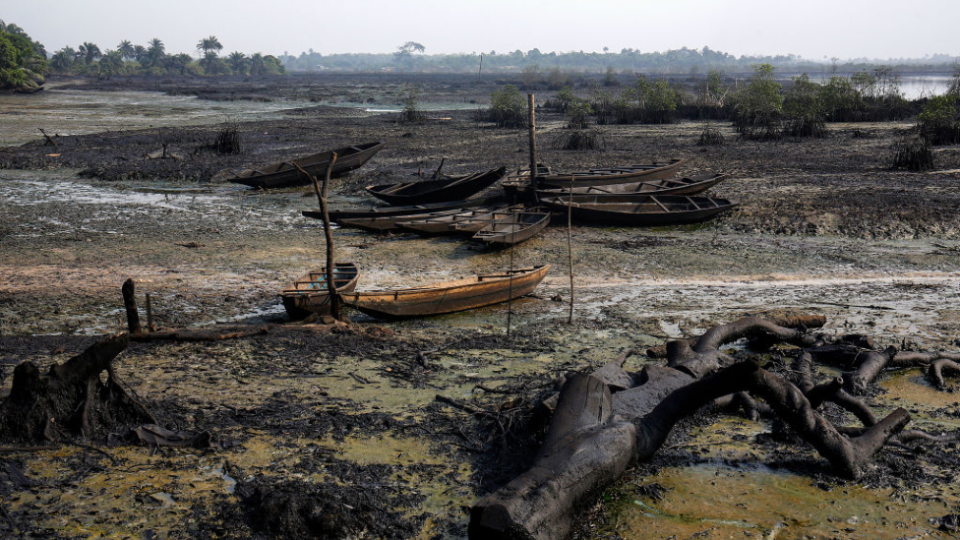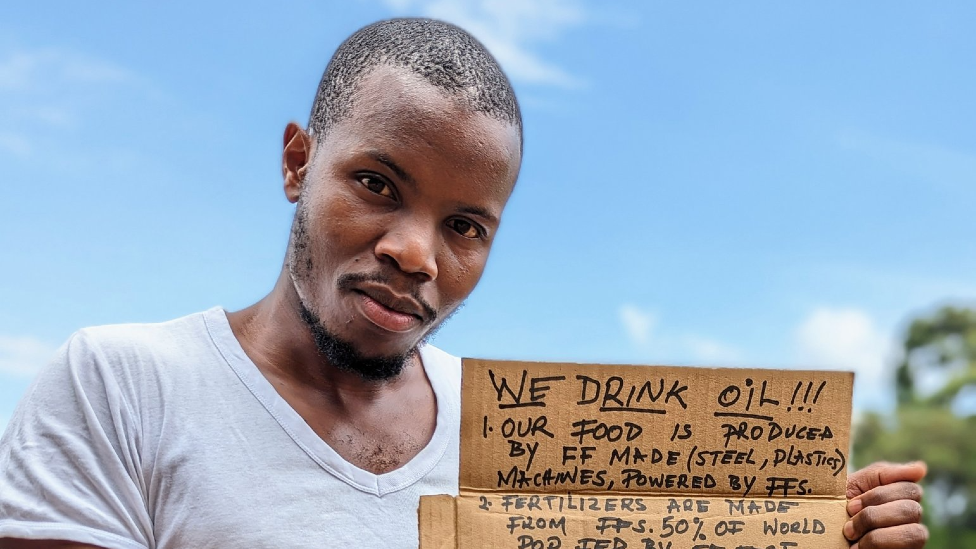Environment modification deniers have actually discovered a brand-new champ in Kenyan farmer Jusper Machogu. On social networks, he has actually ended up being referred to as a flagbearer for nonrenewable fuel sources in Africa, however there is more to his project than fulfills the eye.
Initially look, the 29-year-old Mr Machogu is simply a young farmer with a propensity for social networks.
On X, previously Twitter, he routinely posts videos of himself weeding his land, planting garlic, or selecting avocados – providing audiences a window into life in rural Kisii, south-west Kenya.
While farming material might get him clicks, likes, and retweets, it is Mr Machogu’s rejection of manufactured environment modification that has actually assisted supercharge his online profile.
Given that he started publishing exposed theories about environment modification, he has actually gotten countless dollars in contributions – a few of which originated from people in Western nations connected to fossil-fuel interests.
Mr Machogu insists this has actually not affected his views, stating they are truly held.
Researchers have actually shown that the Earth is warming up due to the fact that of greenhouse gases that are released into the environment when we burn nonrenewable fuel sources – like oil, gas, or coal.
However Mr Machogu disagrees.
“Environment modification is primarily natural. A warmer environment benefits life,” Mr Machogu incorrectly declared in a tweet published in February, in addition to the hashtag #ClimateScam (which he has actually utilized numerous times).
The Intergovernmental Panel on Environment Modification (IPCC) states Africa is “among the most affordable factors to greenhouse gas emissions triggering environment modification”.
Nevertheless, it is likewise “among the most susceptible continents” to environment modification and its impacts – consisting of more extreme and regular heatwaves, extended dry spells, and ravaging floods.
In Spite Of all this, Mr Machogu continues to firmly insist “there is no environment crisis”.
On social networks, he has actually consistently published unproven claims that manufactured environment modification is not just a “rip-off” or a “scam”, however likewise a tactic by Western countries to “keep Africa bad”.
“[His views] are absolutely turning up from a location of absence of understanding,” states Joyce Kimutai, an environment researcher from Kenya who has actually added to IPCC reports.

“This is not faith, this is not simply belief. It has to do with evaluating the information and seeing modifications in the information.
“Stating that environment [change] is a scam is simply truly not real,” Dr Kimutai included.
Mr Machogu started tweeting incorrect and deceptive claims about environment modification in late 2021, after performing his “own research study” into the subject.
Ever Since, he has actually released his own project – which he called “Fossil Fuels for Africa” – arguing that the continent ought to be taking advantage of its huge reserves of oil, gas, and coal.
“We require nonrenewable fuel sources to establish our Africa,” Mr Machogu tweeted in 2015.
This view seems shared by some African federal governments, who have actually provided their consent to brand-new oil and gas tasks regardless of vowing to “shift away” from nonrenewable fuel sources.
Leaders like Ugandan President Yoweri Museveni have actually argued that it is hypocritical for Western countries to enforce constraints on African states, when they have actually prospered from nonrenewable fuel sources.
However environment activists like 24-year-old Nicholas Omonuk, from Uganda, mention that nonrenewable fuel source expedition has actually not constantly been a synonym for development and advancement in Africa.
“In [Nigeria’s] Niger Delta, there’s been oil extraction considering that the 1900s, however individuals there are still bad and are still experiencing health dangers and from contamination,” he stated.


And yet, Mr Machogu thinks he has actually discovered a prepared audience for his message – he has more than 25,000 fans on X.
“I believe Africans are truly welcoming the reality that I’m stating: ‘Nonrenewable fuel sources for Africa’,” he informed the BBC.
However by tracking discussions including Mr Machogu’s X deal with, BBC Verify discovered that many users engaging with his account are really based in the United States, the UK, and Canada.
A number of those users likewise promote conspiracy theories online – not almost environment modification, however likewise about vaccines, Covid-19, or the war in Ukraine.
Nevertheless specific niche its views might be, this online neighborhood has actually tossed its assistance behind Mr Machogu and assisted him money his project.
“Through stating whatever I state, I have seen my fan count increasing and I’ve got individuals connecting to me stating: how can we assist you?,” he stated.


BBC Verify took a look at fundraising pages established by Mr Machogu and discovered that, in the last 2 years, he has actually raised more than $9,000 (£7,000) from contributions.
Mr Machogu has actually published online about utilizing a few of these funds to provide his brand-new home.
However he likewise declares to have actually utilized contributions to assist lots of regional households by constructing a borehole for water, dispersing gas bottles for cooking, or linking their homes to the electrical energy grid.
Amongst his donors were people with links to the nonrenewable fuel source market and to groups understood for promoting environment modification rejection.
However Mr Machogu declines recommendations that those contributions have actually had any influence on his viewpoints on environment modification.
“No one has actually informed me to alter my views,” Mr Machogu firmly insists.
“I don’t have an issue with earning money while stating what I think I ought to state or doing what’s good for my neighborhood.”
Podcast: The Kenyan influencer promoting environment rejection
By sharing his views online, he has actually certainly stood out of lots of in the West who share his position on fossil-fuel expedition and environment modification.
Canadian author Jordan Peterson retweeted among his posts about nonrenewable fuel sources, explaining him as an “real African”, on the other hand with what Mr Peterson called the “bad, oppressed, ineffective African” allegedly pictured by “globalist utopians”.
A US nonrenewable fuel source supporter spent for Mr Machogu to take a trip to South Africa for a conference promoting African oil and gas late in 2015.
And, simply months in the past, a movie team from the UK took a trip to Kisii to interview him for a brand-new documentary that explained environment modification as an “eccentric ecological scare”.
To some, Mr Machogu’s new-found appeal has actually not come as a surprise.
“There’s been a genuine surge in nonrenewable fuel source advancement tasks in Africa,” states Amy Westervelt, a US investigative environment press reporter who covers efforts to block environment policy.
“And due to the fact that a great deal of nations are passing policies that are restricting nonrenewable fuel sources, Africa is likewise viewed as a huge market.
“So, it’s really practical to have individuals in Africa stating: ‘We desire these tasks’.”
That is definitely a point Mr Machogu has actually made – once again and once again – on social networks.
However Dr Kimutai states his promo of nonrenewable fuel sources, in addition to his rejection of manufactured environment modification, might have effects.
“Since we still have low environment literacy levels in Africa and in Kenya, and if that conspiracy theory infects neighborhoods or to individuals, it might simply truly weaken environment action.
“That is truly, truly harmful.”
More stories from BBC Verify:
